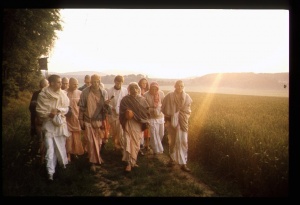SB 1.19.12: Difference between revisions
m (1 revision(s)) |
(Vanibot #0054 edit - transform synonyms into clickable links, which search similar occurrences) |
||
| (One intermediate revision by one other user not shown) | |||
| Line 1: | Line 1: | ||
{{info | {{info | ||
|speaker= | |speaker=Sūta Gosvāmī | ||
|listener=Sages of | |listener=Sages of Naimiṣāraṇya | ||
}} | }} | ||
[[Category:Srimad-Bhagavatam - Canto 01 Chapter 19]] | |||
[[Category:Bhagavatam Verses Spoken by Suta Gosvami - Vanisource|011912]] | |||
<div style="float:left">'''[[Srimad-Bhagavatam]] - [[SB 1|First Canto]] - [[SB 1.19: The Appearance of Sukadeva Gosvami|Chapter 19: The Appearance of Śukadeva Gosvāmī]]'''</div> | |||
<div style="float:right">[[File:Go-previous.png|link=SB 1.19.11]] '''[[SB 1.19.11]] - [[SB 1.19.13]]''' [[File:Go-next.png|link=SB 1.19.13]]</div> | |||
{{CompareVersions|SB|1.19.12|SB 1965|SB 1972-77}} | |||
{{RandomImage}} | |||
==== TEXT 12 ==== | ==== TEXT 12 ==== | ||
<div class="verse"> | |||
<div | :sukhopaviṣṭeṣv atha teṣu bhūyaḥ | ||
sukhopaviṣṭeṣv atha teṣu bhūyaḥ | :kṛta-praṇāmaḥ sva-cikīrṣitaṁ yat | ||
kṛta-praṇāmaḥ sva-cikīrṣitaṁ yat | :vijñāpayām āsa vivikta-cetā | ||
vijñāpayām āsa vivikta-cetā | :upasthito 'gre 'bhigṛhīta-pāṇiḥ | ||
upasthito 'gre 'bhigṛhīta-pāṇiḥ | |||
</div> | </div> | ||
| Line 18: | Line 23: | ||
==== SYNONYMS ==== | ==== SYNONYMS ==== | ||
<div class="synonyms"> | |||
<div | ''[//vanipedia.org/wiki/Special:VaniSearch?s=sukha&tab=syno_o&ds=1 sukha]'' — happily; ''[//vanipedia.org/wiki/Special:VaniSearch?s=upaviṣṭeṣu&tab=syno_o&ds=1 upaviṣṭeṣu]'' — all sitting down; ''[//vanipedia.org/wiki/Special:VaniSearch?s=atha&tab=syno_o&ds=1 atha]'' — thereupon; ''[//vanipedia.org/wiki/Special:VaniSearch?s=teṣu&tab=syno_o&ds=1 teṣu]'' — unto them (the visitors); ''[//vanipedia.org/wiki/Special:VaniSearch?s=bhūyaḥ&tab=syno_o&ds=1 bhūyaḥ]'' — again; ''[//vanipedia.org/wiki/Special:VaniSearch?s=kṛta&tab=syno_o&ds=1 kṛta]-[//vanipedia.org/wiki/Special:VaniSearch?s=praṇāmaḥ&tab=syno_o&ds=1 praṇāmaḥ]'' — having offered obeisances; ''[//vanipedia.org/wiki/Special:VaniSearch?s=sva&tab=syno_o&ds=1 sva]'' — his own; ''[//vanipedia.org/wiki/Special:VaniSearch?s=cikīrṣitam&tab=syno_o&ds=1 cikīrṣitam]'' — decision of fasting; ''[//vanipedia.org/wiki/Special:VaniSearch?s=yat&tab=syno_o&ds=1 yat]'' — who; ''[//vanipedia.org/wiki/Special:VaniSearch?s=vijñāpayām&tab=syno_o&ds=1 vijñāpayām] [//vanipedia.org/wiki/Special:VaniSearch?s=āsa&tab=syno_o&ds=1 āsa]'' — submitted; ''[//vanipedia.org/wiki/Special:VaniSearch?s=vivikta&tab=syno_o&ds=1 vivikta]-[//vanipedia.org/wiki/Special:VaniSearch?s=cetāḥ&tab=syno_o&ds=1 cetāḥ]'' — one whose mind is detached from worldly affairs; ''[//vanipedia.org/wiki/Special:VaniSearch?s=upasthitaḥ&tab=syno_o&ds=1 upasthitaḥ]'' — being present; ''[//vanipedia.org/wiki/Special:VaniSearch?s=agre&tab=syno_o&ds=1 agre]'' — before them; ''[//vanipedia.org/wiki/Special:VaniSearch?s=abhigṛhīta&tab=syno_o&ds=1 abhigṛhīta]-[//vanipedia.org/wiki/Special:VaniSearch?s=pāṇiḥ&tab=syno_o&ds=1 pāṇiḥ]'' — humbly with folded hands. | ||
</div> | </div> | ||
| Line 26: | Line 30: | ||
==== TRANSLATION ==== | ==== TRANSLATION ==== | ||
<div class="translation"> | |||
<div | |||
After all the ṛṣis and others had seated themselves comfortably, the King, humbly standing before them with folded hands, told them of his decision to fast until death. | After all the ṛṣis and others had seated themselves comfortably, the King, humbly standing before them with folded hands, told them of his decision to fast until death. | ||
</div> | </div> | ||
| Line 34: | Line 37: | ||
==== PURPORT ==== | ==== PURPORT ==== | ||
<div class="purport"> | |||
<div | |||
Although the King had already decided to fast until death on the bank of the Ganges, he humbly expressed his decision to elicit the opinions of the great authorities present there. Any decision, however important, should be confirmed by some authority. That makes the matter perfect. This means that the monarchs who ruled the earth in those days were not irresponsible dictators. They scrupulously followed the authoritative decisions of the saints and sages in terms of Vedic injunction. Mahārāja Parīkṣit, as a perfect king, followed the principles by consulting the authorities, even up to the last days of his life. | Although the King had already decided to fast until death on the bank of the Ganges, he humbly expressed his decision to elicit the opinions of the great authorities present there. Any decision, however important, should be confirmed by some authority. That makes the matter perfect. This means that the monarchs who ruled the earth in those days were not irresponsible dictators. They scrupulously followed the authoritative decisions of the saints and sages in terms of Vedic injunction. Mahārāja Parīkṣit, as a perfect king, followed the principles by consulting the authorities, even up to the last days of his life. | ||
</div> | </div> | ||
__NOTOC__ | |||
<div style="float:right; clear:both;">[[File:Go-previous.png|link=SB 1.19.11]] '''[[SB 1.19.11]] - [[SB 1.19.13]]''' [[File:Go-next.png|link=SB 1.19.13]]</div> | |||
__NOTOC__ | |||
__NOEDITSECTION__ | |||
Latest revision as of 18:05, 17 February 2024

A.C. Bhaktivedanta Swami Prabhupada
TEXT 12
- sukhopaviṣṭeṣv atha teṣu bhūyaḥ
- kṛta-praṇāmaḥ sva-cikīrṣitaṁ yat
- vijñāpayām āsa vivikta-cetā
- upasthito 'gre 'bhigṛhīta-pāṇiḥ
SYNONYMS
sukha — happily; upaviṣṭeṣu — all sitting down; atha — thereupon; teṣu — unto them (the visitors); bhūyaḥ — again; kṛta-praṇāmaḥ — having offered obeisances; sva — his own; cikīrṣitam — decision of fasting; yat — who; vijñāpayām āsa — submitted; vivikta-cetāḥ — one whose mind is detached from worldly affairs; upasthitaḥ — being present; agre — before them; abhigṛhīta-pāṇiḥ — humbly with folded hands.
TRANSLATION
After all the ṛṣis and others had seated themselves comfortably, the King, humbly standing before them with folded hands, told them of his decision to fast until death.
PURPORT
Although the King had already decided to fast until death on the bank of the Ganges, he humbly expressed his decision to elicit the opinions of the great authorities present there. Any decision, however important, should be confirmed by some authority. That makes the matter perfect. This means that the monarchs who ruled the earth in those days were not irresponsible dictators. They scrupulously followed the authoritative decisions of the saints and sages in terms of Vedic injunction. Mahārāja Parīkṣit, as a perfect king, followed the principles by consulting the authorities, even up to the last days of his life.